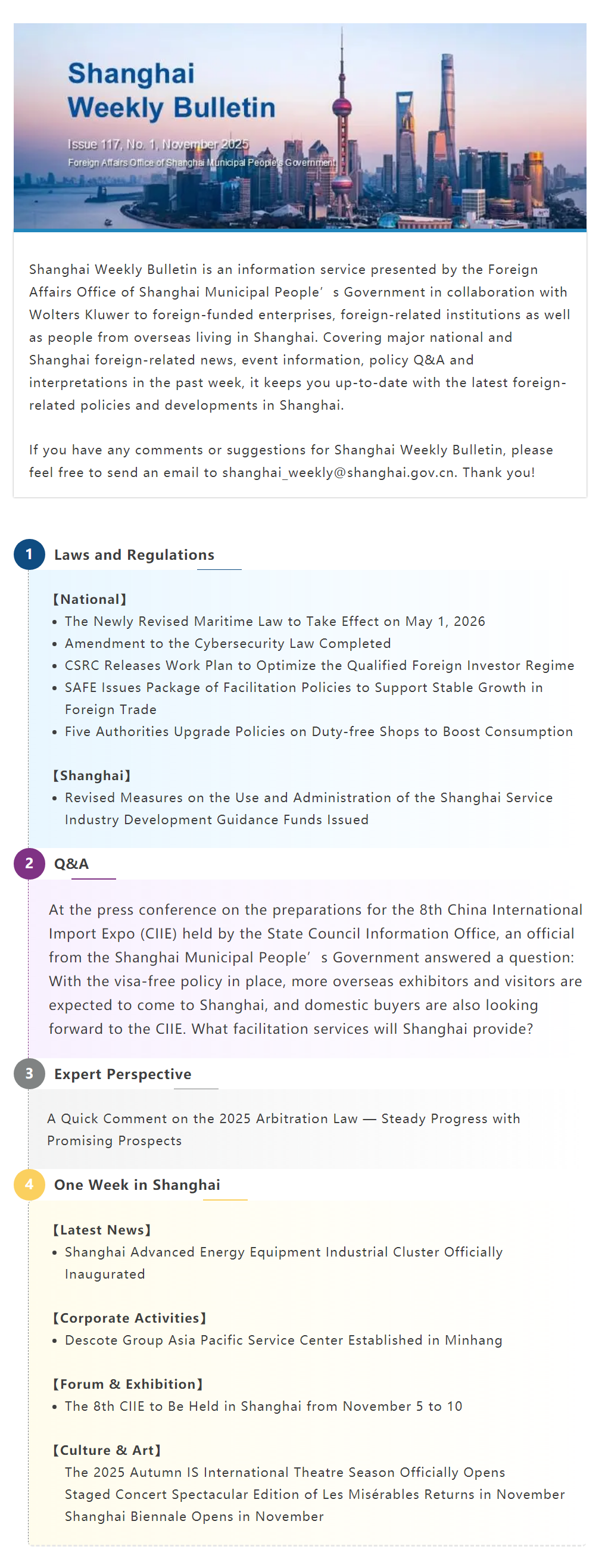Shanghai Weekly Bulletin (Issue 117 No.1, November 2025) ( 2025.11.05 )

Laws and Regulations
National
1. The Newly Revised Maritime Law to Take Effect on May 1, 2026
[Keywords: Maritime Law]
Recently, the 18th Session of the Standing Committee of the 14th National People’s Congress adopted the revised Maritime Law of the People’s Republic of China. The revision specifies that contracts for the international carriage of goods by sea, where the port of loading or the port of discharge is located within the territory of the People’s Republic of China, are governed by Chapter IV “Contracts for Carriage of Goods by Sea”. This Law will take effect on May 1, 2026.
Source: NPC Website
http://www.npc.gov.cn/npc/c2/c30834/202510/t20251028_449061.html
2. Amendment to the Cybersecurity Law Completed
[Keyword: Cybersecurity]
Recently, the 18th Session of the Standing Committee of the 14th National People’s Congress adopted the Decision of the Standing Committee of the National People’s Congress on Amending the Cybersecurity Law of the People’s Republic of China, adding provisions to promote the application and sound development of AI. The document will take effect on January 1, 2026.
Source: NPC Website
http://www.npc.gov.cn/npc/c2/c30834/202510/t20251028_449048.html
3. CSRC Releases Work Plan to Optimize the Qualified Foreign Investor Regime
[Keywords: Qualified foreign investors]
Recently, the China Securities Regulatory Commission (CSRC) released the Work Plan on Optimizing the Qualified Foreign Investor Regime, with a focus on streamlining market access and facilitating investment operations. The document proposes to implement reform measures to optimize the qualified foreign investor regime within approximately two years. It aims to enhance the regime’s appeal to medium- and long-term overseas capital, and foster a new landscape of openness featuring coordinated and complementary onshore and offshore channels, balanced development of allocation-focused and trading-oriented funds, and positive interaction among domestic and overseas securities, fund, and futures institutions.
Source: CSRC
https://www.csrc.gov.cn/csrc/c100028/c7591251/content.shtml
4. SAFE Issues Package of Facilitation Policies to Support Stable Growth in Foreign Trade
[Keywords: Foreign trade, Foreign exchange settlement]
Recently, the State Administration of Foreign Exchange (SAFE) released the Circular on Further Facilitating Foreign Exchange Fund Settlement to Support the Stable Development of Foreign Trade. The document sets out nine policy measures, including expanding the scope of pilot areas for high standard opening up in cross border trade, broadening the types of netting settlement services available to enterprises under the pilot program for the high-standard opening-up of cross-border trade, and streamlining the procedures for centralized receipt and payment as well as netting settlement for current account funds by high-quality multinational corporations.
Source: SAFE
https://www.safe.gov.cn/safe/2025/1027/26714.html
5. Five Authorities Upgrade Policies on Duty-free Shops to Boost Consumption
[Keywords: Duty-free shops]
Recently, the Ministry of Finance and four other authorities issued a notice refining policies on duty-free shops in four areas, further leveraging these policies to support and stimulate consumption. The document will take effect on November 1, 2025.
Source: Ministry of Finance
Shanghai
1. Revised Measures on the Use and Administration of the Shanghai Service Industry Development Guidance Funds Issued
[Keywords: Service industry]
Recently, the Shanghai Municipal People’s Government issued the revised Measures on the Use and Administration of the Shanghai Service Industry Development Guidance Funds, adjusting Article 5 “Scope of Use” and Article 6 “Supporting Methods”. The document took effect on November 1, 2025, and will remain valid through October 31, 2030.
Source: Shanghai Municipal People’s Government
https://www.shanghai.gov.cn/wzjd/20251024/9721342092a14b1084552227bf59c3f7.html
Q&A
At the press conference on the preparations for the 8th China International Import Expo (CIIE) held by the State Council Information Office, an official from the Shanghai Municipal People’s Government answered a question:
Q
With the visa-free policy in place, more overseas exhibitors and visitors are expected to come to Shanghai, and domestic buyers are also looking forward to the CIIE. What facilitation services will Shanghai provide?
A
Shanghai has introduced a series of service measures tailored to the needs of both domestic and overseas exhibitors and visitors.
First, one-stop immigration services are available. For the first time, the electronic port visa system has been extended to overseas exhibitors and visitors of the CIIE. Sixteen dedicated immigration channels for the CIIE have been set up at airport ports to provide on-arrival customs clearance services. For overseas exhibitors and visitors who need to apply for temporary entry permits, a one-stop service covering “review, issuance, and entry procedures” is provided. The comprehensive service centers for foreign nationals at Pudong and Hongqiao airports have been further enhanced to provide foreign exhibitors and visitors with comprehensive, all-day services such as tourist maps, SIM card and transport card sales, and foreign currency exchange.
Exhibitors and visitors can also access the “Easy Go” digital platform online. “Easy Go” integrates 30 mini programs across four major scenarios (i.e., dining, transportation, sightseeing, and shopping), offering services such as food delivery, navigation, and ticket booking. It supports an English main interface and provides real-time multilingual translation.
Second, convenient exhibition services are provided. A comprehensive transportation network has been arranged, including metro, buses, customized shuttle buses, taxis, and reserved parking services. The CIIE-dedicated Bus Line 71 and ten connecting shuttle lines have been opened to link nearby metro stations, parking lots, and commercial areas. Exhibitors and visitors can take a free shuttle bus to reach Hongqiao Railway Station within six minutes or use the dedicated CIIE service line to travel directly to Pudong International Airport.
Focusing on twelve key service scenarios such as exhibition inquiries, visitor services, and appointment scheduling, the “CIIE Smart Assistant” app has been upgraded with enhanced intelligent response capabilities and multilingual support.
The deadline for CIIE badge registration has been extended to October 31, with a seamless transition to a temporary green channel registration system afterward. Within the exhibition venue, business negotiation zones and industry exchange areas have been set up to facilitate communication and cooperation among exhibitors and visitors.
Third, more convenient payment services are available for consumption. Shanghai has established a diversified payment system for inbound consumption, covering mobile payments, bank cards, and cash. A total of 66,000 merchants and 96,000 terminals accept both domestic and international bank cards. “Tap to Pay” has also become a new payment option for overseas visitors in popular commercial districts in Shanghai. All 58 fixed food and beverage outlets inside the CIIE venues support foreign card payments and offer cuisine from various European countries, Japan, South Korea, Southeast Asia, as well as Shanghai specialties and other regional dishes. All metro stations citywide now support QuickPass payment with domestic and international bank cards and enable passage using digital renminbi. Major star-rated hotels are equipped with foreign currency exchange facilities, and taxis carry small change kits.
Shanghai has more than 1,600 tax refund shops for departing visitors and has set up 20 “refund upon purchase” centralized service stations, including one at the National Exhibition and Convention Center (Shanghai). Four of these stations can handle refunds citywide. The “Shanghai Tax Free Online” mobile service platform has been launched to provide overseas exhibitors and visitors with a convenient tax refund experience at their fingertips.
Source: Shanghai Release
Expert Perspective
A Quick Comment on the 2025 Arbitration Law — Steady Progress with Promising Prospects
By He Junming (Shanghai United Law Firm)
[Continued from the Previous Issue]
II. Standardization of China’s Commercial Arbitration Sector from Multiple Perspectives
3. While expanding procedural flexibility in arbitration, the 2025 Arbitration Law address practical pain points such as objections to the validity of arbitration agreements, service of process, and challenges.
Chapter IV of the 2025 Arbitration Law introduces greater procedural possibilities concerning the constitution of arbitral tribunals. At its core, the issue of tribunal formation stems from the broader question of arbitrator selection. As Alan Redfern observed in his writings, “Arbitration is only as good as the arbitrators.” The diversity of tribunal formation methods directly affects the quality of arbitrators, which in turn determines the overall quality of arbitration. The additions in the 2025 Arbitration Law not only affirm the diverse tribunal formation practices already explored by institutions such as the Beijing Arbitration Commission and the China International Economic and Trade Arbitration Commission (CIETAC), but also respond to the long-standing academic discussions on diversification in tribunal constitution, as well as to the increasingly diverse needs of parties in choosing how tribunals are formed.
It is believed that with the continued development of the 2025 Arbitration Law, China’s arbitration sector is well positioned to further promote various methods for tribunal formation and appointing a presiding arbitrator, such as the “recommendation & ranking method” (meaning that, the president of the arbitration institution provides both parties a list of candidates for the presiding arbitrator, and both parties indicate their preferences by ranking acceptable candidates), the “recommendation & selection method” (meaning that, both parties indicate their preferences by selecting acceptable candidates), and the “recommendation & exclusion method” (meaning that, both parties indicate their preferences by striking out unacceptable candidates). At the same time, China’s arbitration industry may internalize international best practices, including the IBA Guidelines on Conflicts of Interest in International Arbitration. By gradually expanding its toolbox in an orderly manner, the system will better support parties in exercising their autonomy and enhance their overall sense of participation and satisfaction in the arbitration process.
Meanwhile, in addressing practical pain points, the 2025 Arbitration Law achieves alignment, through Article 27, with the provisions of the current Civil Procedure Law on objections to the validity of arbitration agreements. It also distils and advances existing domestic rules and international practice. These include, for example, Article 10 of the current CIETAC Arbitration Rules, among other established domestic provisions and widely adopted international commercial arbitration practices. Article 10 provides that “where a party knows or ought to know that any provision or circumstance stipulated in these Rules or in the arbitration agreement has not been observed, yet participates in or continues with the arbitration, or, after receiving valid notice, fails to appear at the hearing without justifiable cause and does not promptly and expressly raise a written objection to such non observance, that party shall be deemed to have waived its right to object.” This article not only clarifies the specific requirements for deemed consent but also clarifies how such deemed consent should be concretely established in practice to facilitate the tribunal’s conduct of proceedings. It is expected that future practice will continue to develop on the basis of this article.
Furthermore, the 2025 Arbitration Law specifies, through Article 41, how the rules on service of documents are to be determined: “Arbitral documents shall be served by a reasonable method agreed upon by the parties; where there is no such agreement or the agreement is unclear, service shall be carried out in accordance with the provisions of the arbitration rules.” This article grants parties greater autonomy over the service of process while designating the arbitration rules as a fallback mechanism. It helps minimize the risk of failed service and provides a practical solution to the long-standing difficulty of document delivery in arbitration proceedings.
In addition, Article 45 of the 2025 Arbitration Law introduces a “proactive disclosure” mechanism. It provides a clearer legal basis, responsible party, and reporting target for declaration of arbitrator’s independence and impartiality that has been widely adopted by leading arbitration institutions in arbitration practices. This mechanism reinforces the value and legitimacy of proactive disclosure, helping to build greater trust among parties in arbitration. It also enhances the credibility of Chinese arbitral awards in recognition and enforcement proceedings before foreign courts, reducing the likelihood of adverse outcomes arising from actual or potential conflicts of interest involving arbitrators.
[To be Continued]
One Week in Shanghai
Latest News
1. Shanghai Advanced Energy Equipment Industrial Cluster Officially Inaugurated
[Keywords: Advanced energy equipment]
Recently, the “Shanghai Advanced Energy Equipment Industrial Cluster” was unveiled. Going forward, the Shanghai Municipal People’s Government will provide strong support for the development of the cluster, advance the mechanism of “coordination at the municipal level, implementation at the district level, and highlighting the principal role of enterprises”, and help the cluster build a high ground for innovation driven industries and deepen global linkages.
Source: Shanghai Municipal Commission of Economy and Informatization
Corporate Activities
1. Descote Group Asia Pacific Service Center Established in Minhang
[Keywords: Descote Group]
Recently, Descote Valve (Shanghai) Co., Ltd., located in the Minhang Science and Technology Park of Shanghai Institute of Technology, held the opening ceremony of the Descote Shanghai Service Center. As an important step in advancing the French Descote Group’s strategy in China, the new company is positioned as the Asia Pacific service center within Descote’s global service system. It will take full responsibility for technical support, sales, and service operations in China and the wider Asia Pacific region.
Source: Minhang Today
Forum & Exhibition
1. The 8th CIIE to Be Held in Shanghai from November 5 to 10
[Keywords: CIIE]
The 8th China International Import Expo (CIIE) will take place in Shanghai from November 5 to 10. A total of 155 countries, regions, and international organizations will participate, with 4,108 overseas enterprises exhibiting. The overall exhibition area will exceed 430,000 square meters, setting a record in scale. The Hongqiao International Economic Forum, held during the same period, will feature 33 sub forums and closed-door meetings. In addition, more than 80 supporting events will be organized for trade matchmaking and investment promotion.
Source: Shanghai Release
Culture & Art
1. The 2025 Autumn IS International Theatre Season Officially Opens
[Keywords: Autumn IS International Theatre Season]

Recently, the 2025 Autumn IS International Theatre Season officially opened. This edition brings together 10 productions with 54 performances from six countries, namely, Belgium, Germany, France, Japan, Belarus, and China. All productions will be staged for the first time in Shanghai, in China, and across Asia. These include the French stage works Bells and Spells, Richard III, and Michael Kohlhaas.
Source: Shanghai Tourism
2. Staged Concert Spectacular Edition of Les Misérables Returns in November
[Keywords: Les Misérables]

On November 4, after a twenty-three-year interval, the Staged Concert Spectacular edition of Les Misérables will return to the Shanghai Grand Theatre, serving as the only stop on the Chinese mainland for this round of the show’s global tour.
Source: Shanghai Grand Theatre
3. Shanghai Biennale Opens in November
[Keywords: Shanghai Biennale]

The 15th Shanghai Biennale, titled “Does the Flower Hear the Bee?”, will be held at the Power Station of Art from November 8, 2025, to March 31, 2026. The exhibition covers nearly 10,000 square meters and presents around 300 works by 67 artists and collectives.
Source: Shanghai Tourism